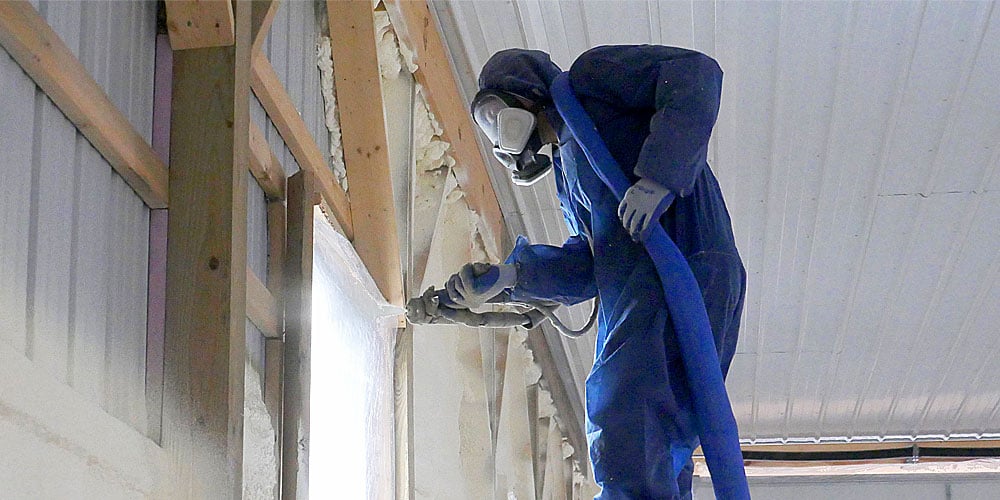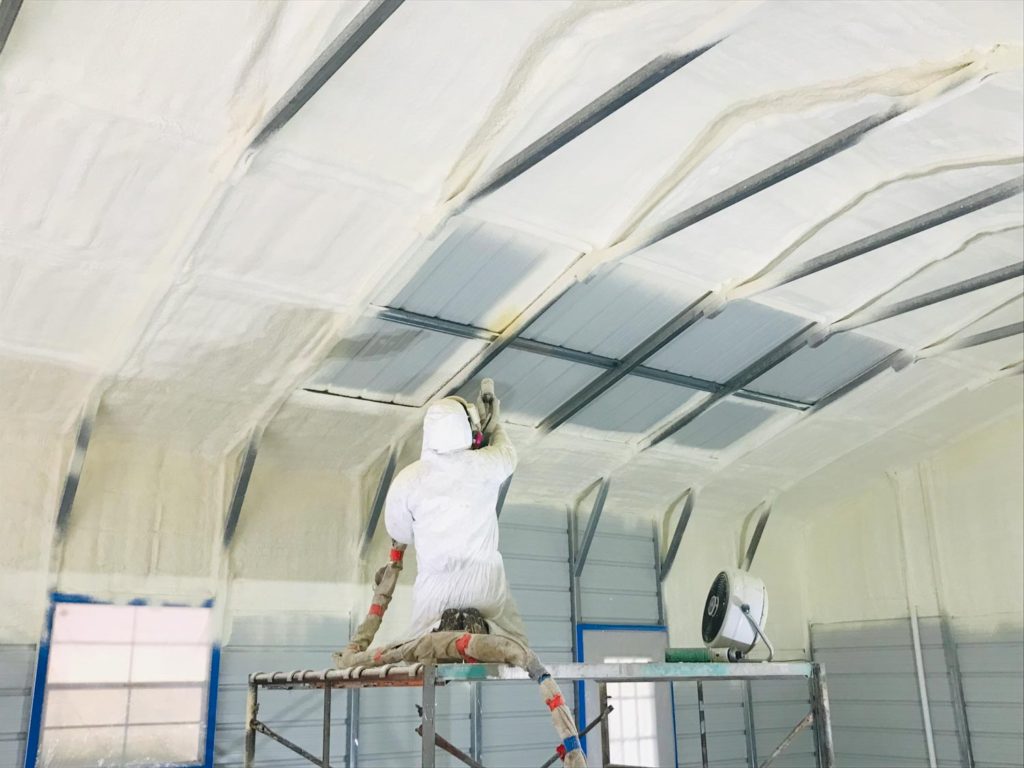Selecting the Right Kind Of Spray Foam for Your Insulation Demands
Selecting the Right Kind Of Spray Foam for Your Insulation Demands
Blog Article
Spray Foam: The Ultimate Remedy for Air Sealing and Insulation
Spray foam insulation has emerged as a leading solution for efficient air securing and thermal insulation, offering an one-of-a-kind combination of residential or commercial properties that set it apart from conventional techniques. Comprehending the full extent of its advantages, installation procedures, and contrasts with various other insulation kinds is crucial for making educated decisions.
What Is Spray Foam?
Spray foam is a versatile insulation product that combines the principles of air sealing and thermal resistance to boost energy efficiency in structures. Made up primarily of polyurethane or other comparable compounds, spray foam is used as a fluid that broadens upon contact with surface areas, creating a strong, continual layer of insulation. This one-of-a-kind home permits it to fill spaces, splits, and gaps that conventional insulation materials may neglect, offering a premium air seal.
There are two major kinds of spray foam: open-cell and closed-cell. Open-cell spray foam is lighter and extra flexible, supplying outstanding audio absorption and a reduced R-value per inch - Spray Foam. On the other hand, closed-cell spray foam is denser, supplying a greater R-value, dampness resistance, and included architectural stability to constructing parts
The application procedure commonly involves customized tools, ensuring a seamless application that sticks to different substratums, including timber, concrete, and metal. This adaptability makes spray foam appropriate for both new buildings and retrofitting existing frameworks. Its capacity to develop an impermeable barrier considerably adds to decreasing power intake and enhancing interior air quality, therefore making it a preferred choice amongst home owners and home builders alike.
Advantages of Spray Foam Insulation
One of one of the most substantial advantages of spray foam insulation is its phenomenal capacity to develop a continual air obstacle, which efficiently minimizes power loss. Unlike traditional insulation products, spray foam increases to fill up fractures and spaces, making sure that air leak is significantly minimized. This characteristic not only enhances power efficiency yet likewise brings about lower energy costs with time.
In addition, spray foam insulation gives remarkable thermal resistance, adding to a much more secure interior setting. Its high R-value per inch allows for effective insulation in confined areas, making it perfect for attic rooms, wall surfaces, and crawl areas. The moisture-resistant residential properties of spray foam aid avoid mold and mold growth, promoting healthier living conditions.
One more important advantage of spray foam insulation is its sound-dampening high qualities (Spray Foam). It efficiently minimizes noise transmission in between areas, creating a quieter and much more comfy home environment. The sturdiness of spray foam likewise stands out, as it does not droop or settle gradually, preserving its performance throughout its life-span
Exactly How Spray Foam Works
Recognizing how spray foam insulation works is vital for appreciating its efficiency in air securing and thermal resistance. Spray foam insulation includes two primary components: isocyanate and polyol resin. When these components are combined, they undertake a chemical response that creates the product to broaden swiftly, producing a thick foam that fills up splits, dental caries, and spaces.
As the foam expands, it follows surface areas, creating a closed seal that significantly reduces air infiltration. This particular makes spray foam insulation extremely pop over to this site effective at stopping drafts and wetness infiltration, which can bring about energy loss and damages with time. Additionally, the closed-cell variation of spray foam provides premium thermal resistance due to its rigid framework, effectively decreasing heat transfer.
The special properties of spray foam permit it to adapt uneven surfaces, making certain extensive protection and a smooth barrier. Because of this, spray foam insulation not only enhances power performance however additionally adds to improved interior air high quality by minimizing the buildup of allergens and pollutants. Eventually, recognizing the technicians behind spray foam highlights its duty as an exceptional selection for insulation and air sealing in both household and business applications.
Setup Process Overview

Prior to setup, the space must be effectively cleaned up and prepped, ensuring that surfaces are without dust, wetness, and particles. This step is crucial because pollutants can compromise attachment and overall performance. Once the location is prepared, the application involves blending the two parts of the spray foam, which broadens you can find out more upon call and loads spaces effectively.
Educated professionals must conduct the installment, utilizing specific devices to ensure consistent insurance coverage and optimal density. Security precautions, consisting of using safety equipment and ensuring proper ventilation, are essential during this process. After application, the foam normally treatments quickly, creating a strong obstacle that boosts energy effectiveness.
Comparing Spray Foam to Typical Insulation
When reviewing insulation options, spray foam insulation stands out in comparison to conventional products such as fiberglass and cellulose. Unlike fiberglass and cellulose, which can enable air infiltration, spray foam broadens upon application, filling gaps and gaps to develop an impermeable seal.
In addition, spray foam gives a higher R-value per inch than traditional insulation kinds, providing even more effective thermal resistance in a thinner profile. This characteristic is especially helpful in spaces with limited dental caries deepness. Spray foam is resistant to wetness and mold and mildew development, which can be a significant concern with cellulose and fiberglass, especially in humid atmospheres.
However, spray foam insulation usually carries a greater in advance cost than its conventional equivalents. Homeowners should evaluate this initial financial investment against long-term power cost savings and performance advantages. Eventually, while both insulation kinds serve their function, spray foam becomes an advanced option for modern-day insulation demands, especially in regards to air securing and thermal effectiveness.

Final Thought
In summary, spray foam insulation represents an extremely effective option for attaining ideal air sealing and Recommended Reading thermal resistance. Its one-of-a-kind residential or commercial properties, consisting of moisture resistance and sound dampening, make it appropriate for various applications in both brand-new buildings and retrofitting projects (Spray Foam). The preliminary prices might be greater contrasted to traditional insulation products, the lasting advantages, such as significant energy savings and boosted interior air high quality, justify the financial investment and highlight its value in contemporary building methods.
Spray foam insulation has actually arised as a leading option for efficient air securing and thermal insulation, supplying a distinct combination of buildings that establish it apart from standard techniques.Spray foam is a functional insulation material that integrates the concepts of air securing and thermal resistance to enhance power efficiency in buildings.When evaluating insulation options, spray foam insulation stands out in contrast to conventional materials such as fiberglass and cellulose. Inevitably, while both insulation kinds serve their objective, spray foam emerges as a more innovative solution for modern-day insulation demands, especially in terms of air sealing and thermal efficiency.
In recap, spray foam insulation represents a highly effective service for attaining optimum air securing and thermal resistance.
Report this page